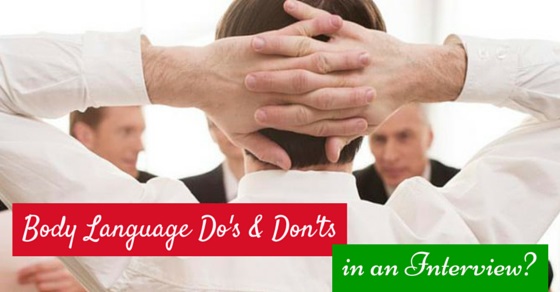It happens with everyone. Body language can give the best or worst impression at first sight. You must have experienced it yourself.
You meet someone in the train, at the bus stop or a shopping center, and if the person appears to be too slouchy, or has a rude expression, you will not even want to even look at the person the second time.
Hence, you should know that body language is something that you should always take care of everywhere and it is at job interviews, that it is extremely important.
Your interviewers make the first few impressions looking at you, the way you appear, the way you talk or look at the opposite person, your handshake, your expressions, the tone of your voice and so on.
Even studies have pointed out that it is not usually the answers that catch a person’s attention but how he or she behaves while answering.
Hence it is important to maintain a good body language at job interviews, because it often forms the basis of your perception and you can nail half the scores with a good and positive body language.
Read on to know some effective dos and don’ts of body language that you should follow while giving a job interview:
Body Language Do’s in Interview:
1. Appear confident:
Confidence is the key to excel in all situations, especially so at job interviews. Confidence is visible in every moment, the way you enter, the way you look, the way you speak, the way you walk and even the way you sit. Let confidence shine all around you and through you. Your battle is half won.
2. Make the entry just right:
The moment you enter should be able to make the interviewer think that this can be the right person for the job. You should appear confident and calm. This isn’t the time to search for copies of your certificates or adjust your bag or hair.
3. Give a firm but friendly handshake:
Since you need your right hand for the handshake, remember to carry your file and bag on the left hand. You should offer your hand in such a way that the hand of the interviewer covers your hand. This also shows the respect that you have for him.
Your handshake should be firm because that means you are a confident person. Smile as you shake hands and maintain eye contact during the same.
4. Maintain eye contact:
You should make eye contact for a few seconds only, because more you do, it will amount to staring. Maintaining eye contact means you are paying good attention to what is being talked about and it also shows a good level of engagement at the interview.
When there are multiple interviewers, you should maintain eye contact with all of them, by turns, of course. Not making any eye contact will make you appear diffident and intimidated.
5. Use your hands correctly:
It is best to keep the hands in your lap or position your arms either on your either sides or on the table. Do gesture with your hands but subtly of course, because too much hand gesturing makes you look aggressive, which is the last thing you want to be in a job interview. Let your subtle hand gestures point to the passion you have about the subjects being talked about.
6. Smile:
A job interview can make anyone nervous. A smile can lower the stress and make you relaxed. Maintain a smile wherever and whenever necessary and refrain from overdoing it.
You can even laugh when the interviewer does or says something funny. A smile can make you appear as a friendly, accessible and kind person.
7. Match with the interviewer:
You should match the positive body language of the interviewer. Mirroring the body language of the interviewer for it will help establish an engagement with him or her.
Match the handshake, the nods, and the smile. You should also be careful in knowing how much mirroring is enough, as too much of it can make the interviewer uncomfortable.
8. Maintain a good posture:
Always sit up straight during a job interview, for it means confidence. At the same time, move a little, lean a little so that they know that you are responding and listening to what is going around. Avoid a stiff posture.
The posture should be in such a way that you look and feel relaxed. It shows that you are a friendly and calm person to work with.
9. Maintain the personal space:
Keep a comfortable distance from the interviewer. The limit can be 20 inches. Too much closeness can make the interviewer uncomfortable and lower your chances.
10. Keep a low and polite tone in your voice:
Do keep a voice tone that is audible yet not too loud or too soft. Speak slowly but in such a way that you keep the natural tone intact.
11. Show that you are interested:
Remind yourself that you have to show you are interested and hide any disinterest. It is by your positive reactions that you tell them that you are enjoying the conversation and you are very interested in the interview.
12. Look relaxed:
Too much of concentration on body language can also make you look stressed, hence be aware of your expressions and your gestures but at the same time, look relaxed.
13. Look at all the interviewers:
When there is more than one interviewer, it is important to look at each of them while you are speaking, not matter who asked you the question. Just because one interviewer was rude to you does not mean you ignore the fellow completely.
14. Listen carefully:
While you have to constantly remind yourself about your body language, it is also important to listen carefully and your face expression should say this clearly that you are listening intently.
15. Leave calmly:
While leaving, do not act in a jiffy. Collect your things calmly, smile and say a polite good bye. Shaking hands too is good at the time of departure and thank them for their time.
Body Language Don’ts in Interview:
1. Droop:
Drooping shoulders or a slouch will mean that you are not very confident or are too laid-back. Check your posture from time to time without making it very obvious.
2. Touch your hair or face:
You may love your hair all right but fidgeting with it or rubbing your nose, head or neck will make you look dishonest, impatient or nervous.
3. Move too much:
Too much body movements mean that you are uncomfortable and nervous. Do not tap with your fingers or move your legs every now and then. These body movements can make you look impatient and indecisive.
4. Lose yourself in the process:
While it is important to maintain a body language that comes across as positive, it is important not to overdo it and lose yourself. Hence it is important to keep it natural and appear relaxed. YOU are what it matters, so maintain that.
5. Fold arms:
A folded arm means two things that either you are aggressive and arrogant or you are appearing to be defensive. You should also not cross your legs.
6. Stare at the interviewer:
It is important to maintain eye contact but too much of it means that you are staring at the interviewer. So, you should know when to look away.
7. Look all around:
Do not look around the room or at the artefacts on the wall. It means you are not at all interested in what is going on around and this can act as a disconnection between you and the interviewer.
Also do not look up or down while talking because that can give an impression that you are being dishonest and are lying
8. Nod to everything:
Do not keep nodding all the time, though a few nods are indeed necessary to show that you are in agreement and you are listening.
Too much nodding gives an impression that you are hardly listening or that you are trying too hard to please.
9. Keep things on your lap:
Do not keep anything or your lap, be it your bag or your files. You can hang the bag on the chair you are sitting and you can keep the files on the table before you.
There are chances that you might start fidgeting with the items in your lap and that is something to avoid completely.
10. Overlook small actions and gestures:
Even small signs should be paid attention to. A slight biting of lips, or wetting your lips with your tongue or even shoulder shrugging should be kept in check. Analyze your usual body language and practice changes before you attend the interview.
11. Sound like a recorder:
Though you should rehearse before your interview, at the job interview, you should not sound as if you have rehearsed too much and that you are just giving rehearsed and practiced answers.
12. Lose cool:
Even if the interviewer asks a personal question or appears to be rude, do not lose cool and be calm. May be he is just trying to test you if you can hold your own against adverse circumstances.
13. Keep a stiff face:
Your face should not appear too stiff devoid of emotions. You should smile, and give positive responses. Your eyes, the way you look at the interviewer and your face expressions should all look positive.
14. Overdo the application of perfume and deodorants:
This is an important part of the body language. One of the first things that the interviewers notice or smell about you is your body odour.
If you have applied a very strong perfume or a strong deodorant, then it appears that you are too much about yourself and that you do not care about others.
15. Appear over-confident:
Confidence is important but exhibiting too much of it is something you should avoid. Over-confidence and arrogance are the same. Nobody wants to hire an arrogant candidate but everybody loves a confident person. Understand the difference and act accordingly.
Conclusion:
Directly or indirectly, the body language of a person gives it all away. Hence, at job interviews it is important that you maintain the best and most positive body language.
The above 15 do’s and don’ts of body language during a job interview will give you a good idea on what to do and what not to.
Practice these steps and you will have a successful job interview. After all, impression is not just about what you are capable of but it is also about how you come across.











































